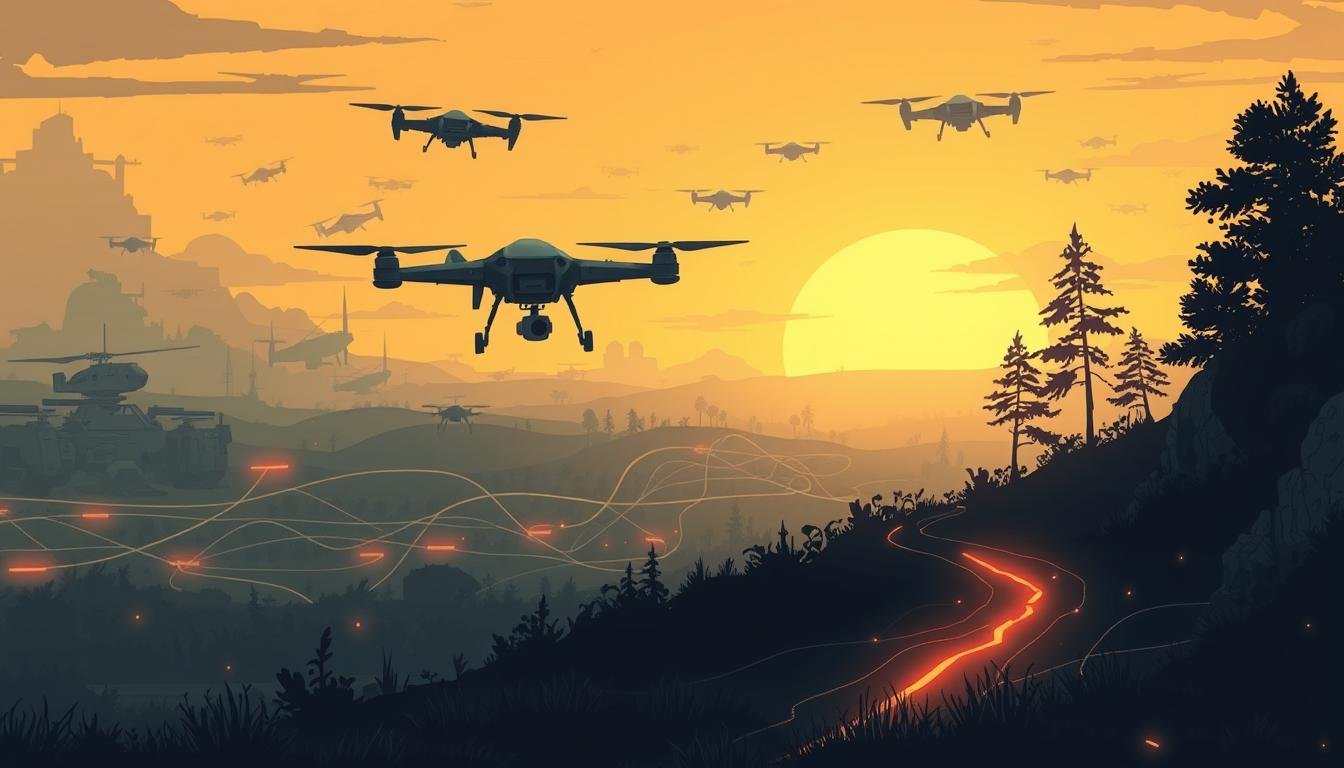AI Ethics in Warfare: Navigating Moral Challenges
Can machines make life-or-death choices on the battlefield? This question is at the center of a growing debate about AI ethics in warfare. As artificial intelligence gets better, its use in military actions brings up tough moral questions.
AI is now used in combat, not just in movies. Yet, only about 5% of articles talk about AI ethics in warfare. This shows we need to learn more about it. Military AI rules are changing, but they can’t keep up with new tech fast enough. The ethics of using AI weapons are especially worrying, leading to strong disagreements among experts and leaders.
We will look into the good and bad sides of AI in the military. We’ll see why we need strong ethical rules for these advanced technologies. Let’s explore the complex world of AI in warfare, where the consequences are huge.
Key Takeaways
- AI integration in warfare raises significant ethical concerns
- Only 5% of articles address AI ethics in military contexts
- Autonomous weapons systems are a hot-button issue in defense circles
- Military AI guidelines struggle to keep up with rapid technological progress
- Balancing military effectiveness with ethical considerations is crucial
- More public discourse on AI ethics in warfare is needed
Introduction to AI in Modern Warfare
AI is quickly becoming a key part of military strategies. The UK, US, EU, and over 50 countries are working on a global AI treaty. This treaty aims to set rules for using AI responsibly in warfare.
The Rise of AI in Military Applications
AI is now making decisions in combat. Countries are investing in AI for military use, raising questions about ethics and security. The treaty aims to balance AI innovation with protecting human rights.
Potential Benefits and Risks of AI in Combat
AI in warfare could lead to better decisions and fewer human losses. But, it also poses risks. There’s a chance of unfair targeting or escalation due to AI bias. The treaty tries to tackle these issues.
The Need for Ethical Considerations
Creating AI that is ethical is essential for military systems. The treaty pushes for transparency and accountability in military AI. It aims to protect human rights while encouraging innovation.
“Global cooperation in the AI space is vital. We must protect human rights while promoting innovation,” says Yaroslav Bogdanov, President of GDA Group.
As AI in warfare grows, finding a balance between tech and ethics is key. The international community’s efforts to regulate military AI show the need for responsible AI use.
AI Ethics in Warfare: Defining the Landscape
AI is changing how wars are fought, bringing up big ethical questions. As AI systems play a bigger role in war, we must think about who’s to blame for harm to civilians. We also need to know how these systems work.
AI helps make decisions in war, but who’s responsible when things go wrong? This is especially important when civilians might get hurt. We need clear rules to make sure AI is used right in battles.
Also, how open should military AI be? Some AI systems are like black boxes, making it hard to see how they decide things. This lack of openness can lead to distrust and misuse. Military groups must find a way to keep things secure while being open about AI use.
“AI in warfare must be governed by strict ethical guidelines to prevent unintended consequences and protect civilian lives.”
To tackle these issues, experts suggest a few things:
- Developing strong tests and checks for military AI systems
- Adding human oversight for AI decisions
- Setting up global standards for AI accountability in war
- Working together between ethicists, policymakers, and military leaders
As AI changes war, we must deal with these ethical problems. Finding a balance between winning wars and doing the right thing will shape AI’s role in combat.
The Evolution of Military AI Technology
The world of warfare is changing fast with the use of machine learning for ethical decisions. This change is a big step forward in military technology. It’s changing how armed forces work and make important decisions on the battlefield.
From Decision Support to Autonomous Systems
Military AI has grown from simple tools to complex autonomous systems. By 2024, AI use will vary among military branches. The Air Force will lead with 45% adoption, followed by the Navy at 38% and the Army at 32%.
Current Capabilities and Future Projections
Today, AI in the military includes drones, predictive maintenance, and threat detection. The AI defense market is growing at 14.5% each year. Soon, we’ll see even more advanced systems, like India’s solar-powered plane that can fly for 90 days at high altitudes.
Case Studies of AI in Military Operations
AI is being used more in military operations. The Airbus Zephyr, the world’s only High-Altitude Pseudo-Satellite (HAPS), flew for 64 days in the US. In India, CSIR-NAL tested a subscale HAPS vehicle, showing AI’s potential for long surveillance and communication.
As AI changes warfare, it’s important to balance tech with ethics. The growth of military AI technology brings both chances and challenges for global security and combat strategies.
Ethical Dilemmas in AI-Powered Combat
AI ethics in warfare is a complex challenge as technology gets better. The use of artificial intelligence in combat raises big questions about control, accountability, and unintended effects. These issues are at the heart of the debate on autonomous weapons ethics.
One major issue is AI systems making life-or-death choices without human check. This could lead to harm to civilians or make conflicts worse than humans can handle. The deep ethical questions this raises need serious thought.
Another problem is how clear AI’s decision-making is in combat. Some AI algorithms are like a “black box,” making it hard to see why they target certain people. This raises big questions about who is accountable and if they follow international laws of war.
“The use of AI in warfare demands a delicate balance between technological advancement and ethical responsibility.”
The table below shows some of the main ethical challenges in AI-powered combat:
| Dilemma | Ethical Concern | Potential Impact |
|---|---|---|
| Autonomous Decision-Making | Lack of human judgment | Unintended casualties |
| Algorithmic Bias | Unfair targeting | Discrimination in warfare |
| Accountability | Unclear responsibility | Difficulty in assigning blame |
| Escalation of Conflict | Rapid, uncontrolled actions | Increased warfare intensity |
As AI keeps getting better, solving these ethical problems is key for its right use in the military. Finding a balance between tech progress and ethics will guide AI’s future in warfare.
Autonomous Weapons Systems: The Debate
The use of AI in the military has started a big debate. As AI makes decisions in combat, the world faces tough moral and security issues.
Arguments For and Against Autonomous Weapons
Some say autonomous weapons can save lives by being more precise. Others fear they lack human judgment in critical moments. The debate is about finding a balance between military needs and ethics.
International Efforts to Regulate “Killer Robots”
For over a decade, the world has tried to control autonomous weapons. The United Nations has talked about it, but agreement is hard to find. Some want a ban, while others suggest rules.
Implications for Warfare and Global Security
AI in combat worries experts about the future of war. They fear it could lead to more conflicts and arms races. The Pentagon’s big investment in AI shows how fast this technology is growing.
| AI Military Investment | Amount | Timeframe |
|---|---|---|
| US Military AI Budget Request | $1.8bn | 2024 |
| Pentagon’s Replicator Initiative | $1bn | By 2025 |
| Air Force AI-Enabled Fighter Jets | $6bn | Next 5 years |
AI is changing how the military fights, and the ethics of autonomous weapons are key. Finding a way to use technology without losing our moral compass is essential for global security.
AI Decision-Making in Combat Scenarios
AI is changing warfare. It helps in making quick decisions in complex battles. This tech boosts awareness and strategic wins.
There’s a big push for AI to follow laws and ethics in war. It looks at many things like civilians and damage risks. This helps AI make better choices.
Using AI in war brings up big questions. Can we trust AI to make life-or-death calls? Humans still decide, but AI helps fast.
| Aspect | Human Decision-Making | AI Decision-Making |
|---|---|---|
| Speed | Slower | Faster |
| Data Processing | Limited | Extensive |
| Emotional Factors | Influenced | Not Influenced |
| Ethical Considerations | Intuitive | Programmed |
| Adaptability | High | Moderate |
AI’s role in war will grow as it gets better. The key is to make AI ethical and effective. This balance will shape AI’s future in war and global security.
Mitigating Algorithmic Bias in Military AI
The use of AI in warfare introduces new challenges. It’s important to ensure AI makes fair and unbiased decisions. This is key to keeping ethics high and avoiding bad outcomes.
Identifying Bias in AI Systems
AI ethics in warfare means checking for biases. These biases can come from:
- Historical data
- System design
- Use in operations
The 2023 REAIM Call to Action points out data bias as a big problem in military AI. It shows we need to test and check AI systems well before using them.
Ensuring Fairness in AI-Driven Warfare
Fair AI in warfare matches with international law. Rule 88 of this law says we can’t make unfair distinctions. So, AI systems must have safeguards against bias.
Role of Diverse Development Teams
Diverse teams are key in fighting AI bias in warfare. They bring different views, helping spot and fix biases. This diversity leads to better AI ethics in warfare.
| Bias Type | Impact | Mitigation Strategy |
|---|---|---|
| Data Set Bias | Misidentification of groups | Diverse, balanced training data |
| Design Bias | Amplifies existing biases | Ethical design principles |
| Operational Bias | Incorrect decisions in pressure | Robust testing in simulated environments |
By tackling these issues, we can make AI in the military more ethical and fair. This ensures AI helps, not hinders, human judgment in important decisions.
Transparency and Accountability in Military AI
The use of AI in military operations raises big questions about openness and responsibility. As AI systems grow in warfare, making sure they don’t harm civilians is key. We need ways to keep AI use open while keeping military secrets safe.
Recent reports show how hard this is. A Biden Administration report on Israeli use of US weapons shows we need strict checks. Studies also point out the risks of AI mistakes in war.
One big worry is not paying enough to those harmed by AI in war. This shows we need clear rules for AI in combat. Creating a system to hold AI accountable could help fix this and bring justice to those hurt.
“The integration of AI in military operations demands a new level of transparency and accountability to prevent unintended consequences and protect civilian lives.”
To tackle these issues, experts recommend:
- Implementing rigorous testing and validation processes for military AI systems
- Creating independent oversight committees to review AI-driven military decisions
- Developing clear protocols for investigating and addressing AI-related incidents
- Enhancing public disclosure of AI use in military operations, within security limits
By focusing on openness and responsibility in military AI, we can make this powerful tech more ethical and responsible in war.
Ethical AI Design for Defense Systems
Creating ethical AI for defense systems is a big challenge. As we make military AI rules, we must balance its power with moral values. This part talks about adding ethics into AI for defense use.
Incorporating Ethical Principles
When making AI for defense, we must think about its moral side. We need to make sure our AI is open, accountable, and fair. This way, we avoid biases and use AI wisely in the military.
Balancing Effectiveness and Ethics
Military AI rules must balance being effective with being ethical. This means:
- AI must respect human rights and follow international laws
- There must be checks to prevent bad outcomes
- Humans should be in charge of big decisions
Collaborative Approaches
Creating ethical AI needs teamwork between ethicists and engineers. This team effort helps us understand the moral sides of AI in defense. Together, we can make better and more ethical AI solutions.
| Aspect | Consideration |
|---|---|
| Transparency | Clear documentation of AI decision-making processes |
| Accountability | Mechanisms for human oversight and intervention |
| Fairness | Mitigation of algorithmic biases in target selection |
| Safety | Rigorous testing and fail-safe mechanisms |
As AI use in defense grows, ethics are more important than ever. By focusing on ethical AI and following strict military AI rules, we can use these technologies responsibly.
AI and the Laws of Armed Conflict
AI in warfare brings new challenges to old laws. As more autonomous weapons are used, we wonder if they follow the rules. It’s important to make sure AI is used right and follows global laws.
Thinking about the ethics of autonomous weapons is key. These systems must follow rules like distinguishing between who’s fighting and who’s not. This gets harder in today’s complex battles.
Lawmakers and experts are working hard to keep up. They need to update or make new laws for AI in war. They focus on:
- Who’s responsible for AI decisions in battles
- Keeping humans in charge of AI weapons
- Setting limits on how much AI can do in war
- Creating global standards for AI in the military
As AI gets better, so must our laws and ethics. It’s a big challenge to use AI in war while still caring for human rights.
Conclusion
AI ethics in warfare is a complex issue that needs careful thought. As AI in the military grows, we must balance new tech with moral duties. The debate on autonomous weapons shows we need clear rules for AI in the military.
We’ve looked at the tough choices AI makes in war, like how it decides and if it’s biased. Using AI in war means we need to be open, answerable, and follow global laws. It’s key to design AI for defense with ethics in mind.
The future of AI in war depends on solving these moral problems. Working together, ethicists, engineers, and leaders can create strong rules. These rules will make sure AI helps the military but also stays ethical. Our ongoing talks on AI ethics will shape global security for years to come.
Source Links
- Digest of Recent Articles on Just Security (Sept. 9-13)
- Overview of Startups Developing Artificial Intelligence for the Energy Sector
- Yaroslav Bogdanov: Major world powers sign first international treaty on the use of AI
- Preferences of Generations of Customers in Slovakia in the Field of Marketing Communication and Their Impact on Consumer Behaviour
- Why Japan is one of the only countries that isn’t fed up with housing costs
- The Best Political Novels of 2024: The Orwell Prize for Fiction
- India’s Pseudo-Satellite: Solar Plane That Can Fly For 90 Days At A Time
- Gordon Woodworth talks Moreau real estate, South Street costs, and Bulldog Pride
- Letter from the Editor: Old favorite comics return along with some new ones
- AI’s ‘Oppenheimer moment’: autonomous weapons enter the battlefield
- Scaling the scope of autonomous weapon attacks
- Seated on the Whirlwind: Artificial Intelligence, Weapons Systems and Moral Agency | Coral Bell School of Asia Pacific Affairs
- The Prevalence and Correlates of Anxiety, Stress, Mood Disorders, and Sleep Disturbances in Poland after the Outbreak of the Russian–Ukrainian War 2022
- The problem of algorithmic bias in AI-based military decision support systems
- AI in military decision-making: supporting humans, not replacing them
- Seeing, Naming, Knowing | The Brooklyn Rail
- History Has Already Discredited the TikTok Ban
- In the Woomera Manual, International Law Meets Military Space Activities
- Breaking News, World News and Video from Al Jazeera
- Essex Police Employs Biometric AI Data
- Innovation redefined: TECNO unveils the all-new | The Express Tribune
- Indian rapper Badshah reveals he owns 1,000 pairs of sneakers | The Express Tribune
- Muscatine Art Center plans for the future







